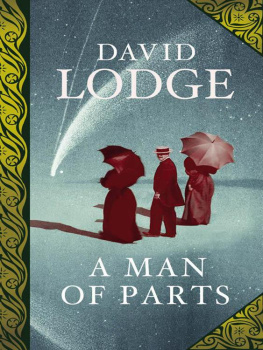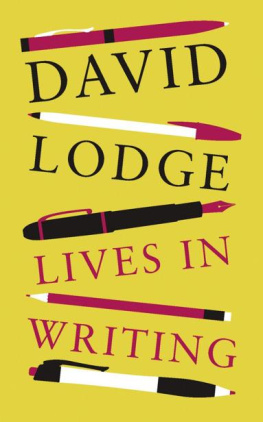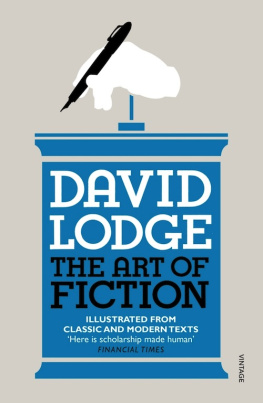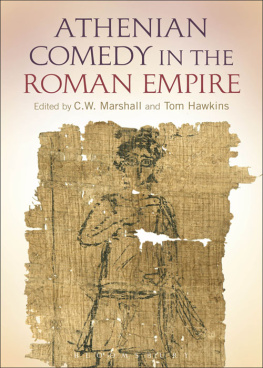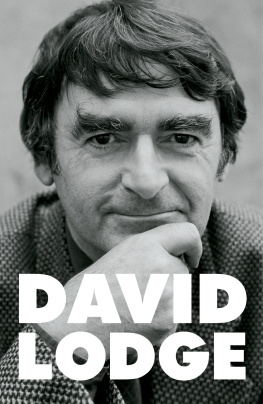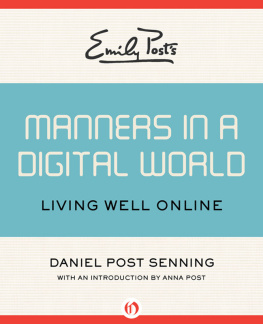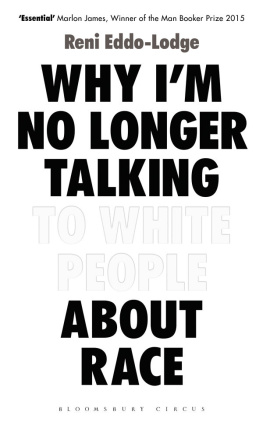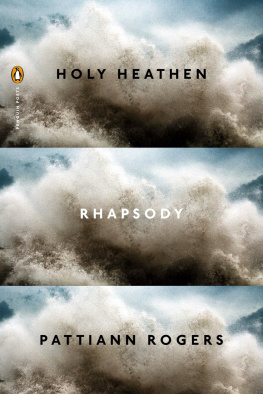David Lodge - Small World
Here you can read online David Lodge - Small World full text of the book (entire story) in english for free. Download pdf and epub, get meaning, cover and reviews about this ebook. year: 1995, publisher: Penguin (Non-Classics), genre: Detective and thriller. Description of the work, (preface) as well as reviews are available. Best literature library LitArk.com created for fans of good reading and offers a wide selection of genres:
Romance novel
Science fiction
Adventure
Detective
Science
History
Home and family
Prose
Art
Politics
Computer
Non-fiction
Religion
Business
Children
Humor
Choose a favorite category and find really read worthwhile books. Enjoy immersion in the world of imagination, feel the emotions of the characters or learn something new for yourself, make an fascinating discovery.
- Book:Small World
- Author:
- Publisher:Penguin (Non-Classics)
- Genre:
- Year:1995
- Rating:3 / 5
- Favourites:Add to favourites
- Your mark:
- 60
- 1
- 2
- 3
- 4
- 5
Small World: summary, description and annotation
We offer to read an annotation, description, summary or preface (depends on what the author of the book "Small World" wrote himself). If you haven't found the necessary information about the book — write in the comments, we will try to find it.
Small World — read online for free the complete book (whole text) full work
Below is the text of the book, divided by pages. System saving the place of the last page read, allows you to conveniently read the book "Small World" online for free, without having to search again every time where you left off. Put a bookmark, and you can go to the page where you finished reading at any time.
Font size:
Interval:
Bookmark:
David Lodge - Small World
Authors Note
LIKE Changing Places, to which it is a kind of sequel, Small World resembles what is sometimes called the real world, without corresponding exactly to it, and is peopled by figments of the imagination. Rummidge is not Birmingham, though it owes something to popular prejudices about that city. There really is an underground chapel at Heathrow and a James Joyce Pub in Zurich, but no universities in Limerick or Darlington; nor, as far as I know, was there ever a British Council representative resident in Genoa. The MLA Convention of 1979 did not take place in New York, though I have drawn on the programme for the 1978 one, which did. And so on.
Special thanks for information received (not to mention many other favours) are due to Donald and Margot Fanger and Susumu Takagi. Most of the books from which I have derived hints, ideas and inspiration for this one are mentioned in the text, but I should acknowledge a debt to two which are not: Inescapable Romance: Studies in the Poetics of a Mode by Patricia A. Parker (Princeton University Press, 1979) and Airport International by Brian Moynahan (Pan Books, 1978).
WHEN April with its sweet showers has pierced the drought of March to the root, and bathed every vein of earth with that liquid by whose power the flowers are engendered; when the zephyr, too, with its dulcet breath, has breathed life into the tender new shoots in every copse and on every heath, and the young sun has run half his course in the sign of the Ram, and the little birds that sleep all night with their eyes open give song (so Nature prompts them in their hearts), then, as the poet Geoffrey Chaucer observed many years ago, folk long to go on pilgrimages. Only, these days, professional people call them conferences.
The modern conference resembles the pilgrimage of medieval Christendom in that it allows the participants to indulge themselves in all the pleasures and diversions of travel while appearing to be austerely bent on self-improvement. To be sure, there are certain penitential exercises to be performedthe presentation of a paper, perhaps, and certainly listening to the papers of others. But with this excuse you journey to new and interesting places, meet new and interesting people, and form new and interesting relationships with them; exchange gossip and confidences (for your well-worn stories are fresh to them, and vice versa); eat, drink and make merry in their company every evening; and yet, at the end of it all, return home with an enhanced reputation for seriousness of mind. Todays conferees have an additional advantage over the pilgrims of old in that their expenses are usually paid, or at least subsidised, by the institution to which they belong, be it a government department, a commercial firm, or, most commonly perhaps, a university.
There are conferences on almost everything these days, including the works of Geoffrey Chaucer. If, like his hero Troilus at the end of Troilus and Criseyde, he looks down from the eighth sphere of heaven on This litle spot of erthe, that with the se Embraced is and observes all the frantic traffic around the globe that he and other great writers have set in motionthe jet trails that criss-cross the oceans, marking the passage of scholars from one continent to another, their paths converging and intersecting and passing, as they hasten to hotel, country house or ancient seat of learning, there to confer and carouse, so that English and other academic subjects may be kept upwhat does Geoffrey Chaucer think?
Probably, like the spirit of Troilus, that chivalrous knight and disillusioned lover, he laughs heartily at the spectacle, and considers himself well out of it. For not all conferences are happy, hedonistic occasions; not all conference venues are luxurious and picturesque; not all Aprils, for that matter, are marked by sweet showers and dulcet breezes.
APRIL is the cruellest month, Persse McGarrigle quoted silently to himself, gazing through grimy windowpanes at the unseasonable snow crusting the lawns and flowerbeds of the Rummidge campus. He had recently completed a Masters dissertation on the poetry of T. S. Eliot, but the opening words of The Waste Land might, with equal probability, have been passing through the heads of any one of the fifty-odd men and women, of varying ages, who sat or slumped in the raked rows of seats in the same lecture-room. For they were all well acquainted with that poem, being University Teachers of English Language and Literature, gathered together here, in the English Midlands, for their annual conference, and few of them were enjoying themselves.
Dismay had been already plainly written on many faces when they assembled the previous evening for the traditional sherry reception. The conferees had, by that time, acquainted themselves with the accommodation provided in one of the Universitys halls of residence, a building hastily erected in 1969, at the height of the boom in higher education, and now, only ten years later, looking much the worse for wear. They had glumly unpacked their suitcases in study-bedrooms whose cracked and pitted walls retained, in a pattern of rectangular fade marks, the traces of posters hurriedly removed (sometimes with portions of plaster adhering to them) by their youthful owners at the commencement of the Easter vacation. They had appraised the stained and broken furniture, explored the dusty interiors of cupboards in vain for coat-hangers, and tested the narrow beds, whose springs sagged dejectedly in the middle, deprived of all resilience by the battering of a decades horseplay and copulation. Each room had a washbasin, though not every washbasin had a plug, or every plug a chain. Some taps could not be turned on, and some could not be turned off. For more elaborate ablutions, or to answer a call of nature, it was necessary to venture out into the draughty and labyrinthine corridors in search of one of the communal washrooms, where baths, showers and toilets were to be foundbut little privacy, and unreliable supplies of hot water.
To veterans of conferences held in British provincial universities, these were familiar discomforts and, up to a point, stoically accepted; as was the rather inferior sherry served at the reception (a little-known brand that seemed to protest too much its Spanish origins by the lurid depiction of a bullfight and a flamenco dancer on the label); as was the dinner which awaited them afterwardstomato soup, roast beef and two vegetables, jam tart with custardfrom every item of which all trace of flavour had been conscientiously removed by prolonged cooking at high temperatures. More than customary aggravation was generated by the discovery that the conference would be sleeping in one building, eating in another, and meeting for lectures and discussions on the main campus, thus ensuring for all concerned a great deal of tiresome walking to and fro on paths and pavements made dangerous and unpleasant by the snow. But the real source of depression, as the conferees gathered for the sherry, and squinted at the little white cardboard lapel badges on which each persons name, and university, were neatly printed, was the paucity and, it must be said, the generally undistinguished quality of their numbers. Within a very short time they had established that none of the stars of the profession was in residenceno one, indeed, whom it would be worth travelling ten miles to meet, let alone the hundreds that many had covered. But they were stuck with each other for three days: three meals a day, three bar sessions a day, a coach outing and a theatre visitlong hours of compulsory sociability; not to mention the seven papers that would be delivered, followed by questions and discussion. Long before it was all over they would have sickened of each others company, exhausted all topics of conversation, used up all congenial seating arrangements at table, and succumbed to the familiar conference syndrome of bad breath, coated tongue and persistent headache, that came from smoking, drinking and talking five times as much as normal. The foreknowledge of the boredom and distemper to which they had condemned themselves lay like a cold, oppressive weight on their bowels (which would also be out of order before long) even as they sought to disguise it with bright chatter and hearty bonhomie, shaking hands and clapping backs, gulping down their sherry like medicine. Here and there people could be seen furtively totting up the names on the conference list. Fifty-seven, including the non-resident home team, was a very disappointing turnout.
Next pageFont size:
Interval:
Bookmark:
Similar books «Small World»
Look at similar books to Small World. We have selected literature similar in name and meaning in the hope of providing readers with more options to find new, interesting, not yet read works.
Discussion, reviews of the book Small World and just readers' own opinions. Leave your comments, write what you think about the work, its meaning or the main characters. Specify what exactly you liked and what you didn't like, and why you think so.

